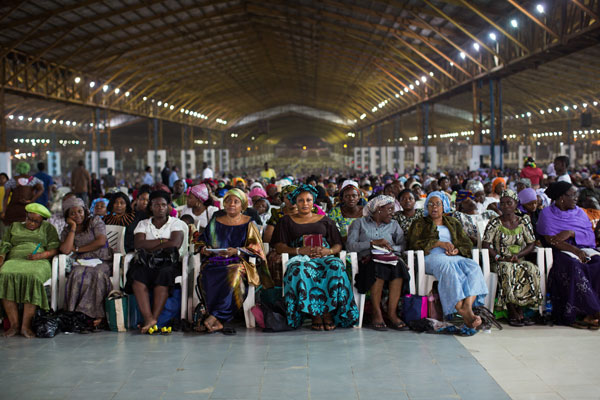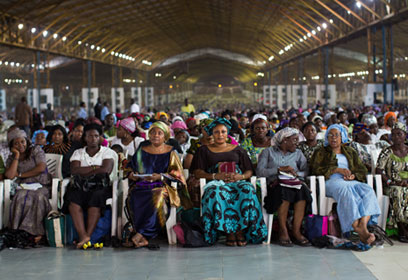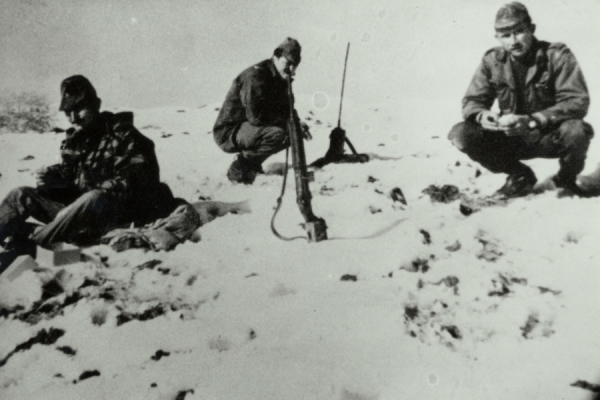
Attendees listen during a Holy Ghost service, a prayer gathering hosted by the Redeemed Christian Church of God, at Redemption Camp on the outskirts of Lagos, September 6, 2013. The auditorium can accommodate a million worshippers. | Photograph: Allison Shelly
In the fifty-five years since independence, Nigeria has seen six coups, nine military dictators, and five democratically elected presidents—six if you count one whose victory was thrown out. Only two have completed their terms in office. The first three presidents following redemocratization in 1999 came from the same political party.
This changed on March 31, when Goodluck Jonathan made history by conceding the presidential election to his opponent, Muhammadu Buhari. On inauguration day two months later, Jonathan became the first incumbent president of Nigeria to peacefully hand over office to a member of the opposition party.
Jonathan, a Christian from the southern state of Bayelsa, was elected in 2010. Buhari, a Muslim and born-again democrat from the northern state of Katsina, headed a repressive military regime in the 1980s. His victory came amid the violent insurgency of Boko Haram, which catapulted to international attention when it claimed responsibility for kidnapping 276 schoolgirls in 2014.
Religion has long served as a political resource in Nigeria, with Muslims and Christians alike appealing to the faithful, and decrying each other, to win elections. One might have expected more of the same with Boko Haram in the headlines, particularly from Christian leaders eager to exploit fear of Islamism. But over the past several months, we witnessed something new: the re-emergence of ethnic over religious solidarity and the forging of unexpected alliances between southerners and northerners, Christians and Muslims, Yoruba and Hausa.
• • •
Nigeria is one of the only countries, and certainly the largest, with a population roughly split between Christians and Muslims. At least 80 million Nigerians are Christians—most of them evangelicals, loosely defined to include mainline Protestants, Pentecostals, and charismatics. Only the United States is home to more evangelicals. Historically, the North has been largely Muslim and the South Christian. The distribution has shifted somewhat in recent decades with internal migration to the metropolis of Lagos in the southwest and the proliferation of Christian missions (largely Nigerian-led) in the North. Still, for the most part the north-south division stands.
Rather than solidify the Muslim-Christian divide, Nigeria's election encouraged alliances.
Christianity first took root in Nigeria with the arrival of European missionaries and freed slaves in the mid-nineteenth century. Inspired and frustrated by these mission churches, Africans started establishing their own churches in the first decades of the twentieth century. Many centered on native prophets and traditions. Pentecostal missionaries began arriving in the 1930s and ’40s, often in response to African invitations, and new, charismatic forms of Christianity—that is, Christianity centered on the charismata: healing, prophecies, and other gifts of the Holy Spirit—have blossomed since the 1980s. These charismatic Christians cast out demons, fight witches, and harness the power of Jesus to overcome the devil, whom they hold responsible for everything from failing grades to failing states.
The growth of charismatic churches has been accompanied by the rise of celebrity pastors. Self-styled bishops and prophets, they have accrued considerable influence and wealth. They produce books, videos, and websites, and preside over YouTube channels with millions of followers. They hold prayer services around the world and supervise international missionary activities. Nigerian tabloids cover their exploits as though they were Nollywood actors. These “Big Men”—nearly all are men—travel in caravans of dark-windowed Land Rovers, accompanied by actual big men in reflective sunglasses. The most successful of them, Pastor Enoch Adejare Adeboye of the Redeemed Christian Church of God, flies in his own private jet. Adeboye’s monthly revival services held in Redemption Camp, Redeemed’s purpose-built city on the outskirts of Lagos, attract upward of a million faithful. Construction has recently wrapped up on a new arena there, which, at three kilometers long and three kilometers wide, is large enough to seat the 6 million who attend his annual Christmastime Holy Ghost Congress.
For at least the past fifteen years, ever since redemocratization in 1999 and the implementation of a sharia-based criminal code by twelve northern states, these pastors and their followers have insisted that Nigeria is a Christian nation. By developing a particularly virulent rhetoric of Christian unity as a response to northern assertions that Nigeria should be governed by Muslim law, Christians, too, reframed longstanding ethno-regional political battles in religious terms. In 2000 the chairman of the newly formed National Prayer Conference declared, “Nigeria is a country favored by God” and “strategic in God’s end-time move.” The same year, the monthly magazine Redemption Light, mouthpiece of Adeboye’s church, announced that the Ark of the Covenant had moved to Nigeria and that when Jesus returned, it would be to Redemption Camp. By joining together in fervent prayer, Nigerian Christians could not only hasten the Second Coming but also save the country from the satanic forces constantly threatening its implosion. This politically motivated revivalist message has persisted as the common cause across Christian denominations.
Now this rhetoric has suddenly failed. The latest election shows that religious identity does not trump all. Rather than solidify the Muslim-Christian divide, the vote revitalized longstanding divisions among Christians and encouraged alliances across religious lines. Whom to support, Buhari or Jonathan, became a polarizing issue. As an unnamed Redemption Light columnist put it, “No discussion at any [church] meeting was complete without a bit of argument and hot exchanges about the nation and the polity.” Some made the case for Christian solidarity, arguing that Christians must remain united in order to protect the nation. Others argued that Jonathan had been a lousy president who had allowed Boko Haram to thrive, mismanaged the economy, broken his promise not to run in 2015, and used his position mostly to enrich members of his own minority ethnic group. Those arguing loudest that Jonathan and his administration were inept, thieving louts were Yoruba—the leading ethnic group from the economically and culturally dominant Southwest—with no patience for an Ijaw from the South-South, Christian or not.
Opinion was divided among Christian leaders as well. Each new year, leading pastors offer prophecies, and on the eve of 2015, many came out in support of Jonathan. One promised that the gates of hell would be opened on all who opposed him. But a few were against him; one declared that, in spite of his name, the president had become “bad luck” and would lose by the grace of God and for the good of Nigeria. Some hedged their bets. Adeboye, for instance, kept his cards close to his chest, making only a happy promise: “By the end of the year, many will say ‘all is well that ends well.’”
Adeboye’s circumspection was likely a response to Buhari’s choice of Yemi Osinbajo, a Yoruba pastor and one of Adeboye’s close advisors, as his running mate. It quickly became clear that the choice had been made with Adeboye’s support. News outlets reported that Buhari had phoned Adeboye to ask for his blessing before announcing the selection on December 17. A few weeks later, the three men were photographed attending a state New Year’s thanksgiving service together. At no point during the campaign did Adeboye come out expressly for or against either presidential candidate, but many saw the addition of Osinbajo to the ticket as evidence of Adeboye’s unspoken support for
Buhari’s candidacy.
We may see a turn away from spiritual warfare as problems are blamed on humans, not demons.
Adeboye could have thrown his weight behind Jonathan instead. The former president courted the preacher aggressively during the campaign, as he had done throughout his presidency. In February, just weeks before the election, he attended a revival service at Redemption Camp, where he addressed the crowd. Acknowledging the threat of religious extremism and terrorist activities, he thanked his “brothers and sisters in Christ” for their “prayers for this nation,” and asked them to continue “to pray for peace in our land.” This was textbook Christian rhetoric. Indeed, Jonathan was so eager for an endorsement that he bent to his knees in front of Adeboye to receive his blessing, for the whole congregation to see. But the pastor remained as opaque as ever. Asking God for peace both during the elections and after, Adeboye concluded obliquely “that the perfect will of God for Nigeria will be done.”
As a Muslim, Buhari would not attend a Holy Ghost Night, but he continued to do what he could to cultivate a public relationship with Adeboye as well. On Adeboye’s March 2 birthday—which is celebrated as an annual holiday by the Redeemed community, with approximately two million making the pilgrimage to a special two-night revival service held at Redemption Camp—Buhari was one of many politicians issuing congratulations. “Your role as a nation builder is being acknowledged by all,” he told Adeboye, “and I enjoin you to continue in your service to God and humanity.” Nation builder—or, in this case, king maker.
Easter Sunday fell just a few days after the election. It was then that the rhetorical tide really began to turn. The Easter messages came fast and furious.
Many of these messages called for a new sense of unity and a new focus on cooperation. The governor of Jonathan’s home state asked for love and tolerance, requesting that all Nigerians—Christian, Muslim, or otherwise—see each other as a single people with a common destiny. Similarly, the head of Nigeria’s largest ecumenical Christian organization called for “harmony between Christians and Muslims in their quest for a prosperous Nigeria.” The Sultan of Sokoto, leader of a Muslim ecumenical counterpart, made the same plea, emphasizing Christians’ and Muslims’ shared identity “as a people of faith united by our common ancestor, Prophet Ibrahim.” He called for urgent attention to “the recent history of distrust within our faith communities.” One following the other in quick succession, the elections and Easter offered the chance for “a new beginning of rectitude and righteousness as one people under God,” the Sultan exclaimed.
One people under God. Praying for the nation together. Fighting religious extremism together. Whither Christian prayer, the only hope of ridding Nigeria of demonic forces and saving the nation?
To be fair, it must be noted that this year’s Muslim-Christian ticket was not the first in Nigerian presidential politics. Jonathan himself first came into national office as the running mate of a Muslim candidate. What is significant about the Buhari-Osinbajo alliance is that Christians broke ranks to support it, ranks that had been strengthening for the past fifteen years. And they did so at the tacit, and sometimes explicit, urging of their most powerful leaders.
Jonathan’s prayer at the February revival, when he called on Christians to vote as Christians, was the old way. We are now beginning to see a new way. The political alliance that delivered Buhari the election—Yoruba Christians partnering with Hausa Muslims—is unlike any seen before. Now that the elections are concluded, there are widespread calls for national unity and religious tolerance. At this moment, there is more to be gained through extending olive branches than launching rhetorical attacks.
Perhaps we will also see a turn away from spiritual warfare, as problems are blamed less on demons and more on humans. Perhaps there will be a return to activism, the kind that was thoroughly stamped out under Buhari’s rule the first time around, as civil society begins to engage in actions more material than prayer. While it is unlikely we will see the decline of prayer as a rhetorical strategy, praying for the nation seems to be becoming more inclusive. This will make it hard for Christians to continue to insist that the only way to preserve the nation is to cover it with the blood of Jesus.
Religion is still a political resource, but now it offers a rhetoric of unity rather than difference. Buhari was elected because voters were infuriated with the corrupt incumbent administration, whose abject disinterest in Boko Haram had allowed it to grow into a serious danger. And so Christians set aside their talk of prayer for the nation. They placed their national and ethnic identities ahead of their religious identity and reached out across religious, ethnic, and regional lines in unprecedented ways. They decided to see northern Muslims as partners in removing an inept president from office and as allies in the fight against extremism, rather than as extremists themselves. Perhaps Boko Haram’s threat to the Nigerian state is what will save it. Because the group provides what any alliance needs: a common enemy.








